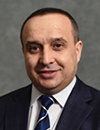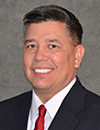Biomedical Engineering Program to Join Rangos School of Health Sciences
Duquesne’s Biomedical Engineering (BME) Program will join the John G. Rangos Sr. School of Health Sciences effective Monday, July 1.
Launched in 2013 to capitalize on strengths in the sciences at Duquesne, the BME program is the only engineering degree of its kind offered in southwestern Pennsylvania at a top-tier Catholic research institution. Biomedical engineering is one of the fastest growing areas within the field and one of the most diverse.
The BME program focuses on improving human health in several distinct areas, including biomedical optics, biomaterials, orthopedic biomechanics, biophysical interactions, drug delivery and biosensor development—many of which are applications used in various physical and occupational therapies, health management and other health and wellness solutions.

“Interdisciplinary collaboration among a team of health care professionals, managers, engineers, insurers and policy makers is critically important to improving the patient experience of care, health of populations and reducing the per capita cost of health care,” said Health Sciences Dean Dr. Fevzi Akinci. “The work of our colleagues in biomedical engineering fits perfectly with our areas of study and inquiry as they are educating students to create the technology solutions for future health challenges.”
With more than 1,000 students and 50 full-time faculty members, the School of Health Sciences is one of the largest health sciences schools in the country, with a national reputation for excellence in clinical instruction, research and advocacy. The school offers programs in athletic training, health management systems, health administration, rehabilitation science, occupational therapy, physical therapy, physician assistant studies and speech-language pathology.

The BME program existed as a freestanding program to begin recruiting students and establishing its viability. In the last two years, the program graduated its first students and developed a master’s offering. With the six faculty and two staff members of BME now benefitting from the infrastructure of the School of Health Sciences, the BME program will be well positioned to grow and develop other offerings.
“Our administrative alignment with the Rangos School makes good sense,” said BME Program Director Dr. John Viator. “We enhance, create and test many of the solutions that drive the success of health professionals in creating better patient outcomes. We envision numerous ways to collaborate and learn from one another in clinical and research settings.”
Both the School of Health Sciences and BME focus on educating engineers, clinicians, practitioners and researchers whose education includes ethical, cultural and moral considerations, with an emphasis on service consistent with Duquesne’s emphasis on serving God by serving others.
